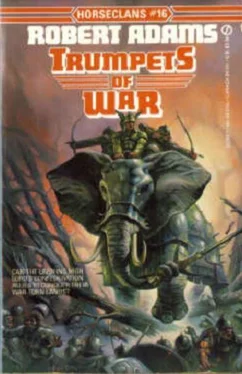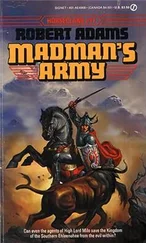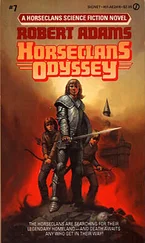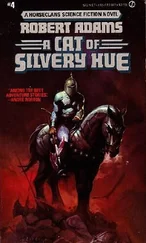“Ask the present lord of Hwailehpolis if he now recalls aught of a stallion, a dead man’s sword and a bag of gold.”
But then code words and phrases were fairly common (though less so at this than at certain other courts Lord Eraldos had served in his lifetime, he was happy to say), so he dutifully jotted it down on the prompting pad he kept in his mind and then continued with seemingly endless routines. With one occurrence and another, however, it was not for some two hours that he remembered to pad around the table to the mentioned thoheeks and diffidently put to him this singularly odd question, to then be scared nearly out of his wits.
Thoheeks Vikos of Hwailehpolis sent his heavy chair crashing over as he leaped to his feet and clamped his big, hard hands on both the startled assistant chamberlain’s shoulders with crushing force.
“Where is this man, Eraldos?” he demanded. “What would you estimate his age? Did he come alone of his own will or did others bring him?”
When he did not get an immediate answer, Thoheeks Vikos’ eyes flashed fire and he shook the chamberlain as a terrier shakes a rat. “Well? Well, man, will you answer me?”
Lord Eraldos’ lips moved but no sounds emerged. As Vikos set himself to another round of shaking, Thoheeks Portos gripped his forearm, admonishing, “Have done, Vikos, have done! Between shaking and terror, you’ve rendered the poor man dumb with fright.”
When the trembling functionary had scuttled out of the chamber to fetch back the petitioner, Vikos made to explain his atypical actions to his peers at the council table. “It was after that gory debacle at Ahrbahkootchee, in the early days of the war against Hyamos’ son, Prince Rahndos. I had fought through all of that black day as an ensign in my late elder brother’s troop of heavy horse, and in the wake of the main army’s rout by the war-elephants, I and full many another poor nobleman found myself unhorsed, disarmed and hunted like some wild and desperate beast through the swamps of the bottomlands.
“Near to dusk, I was wading across a broad pool when I heard yet again the crashing of brush and the shouts of horsemen. They sounded almost atop me, so I broke off a long, hollow reed and went under the water, as I had had to do right many times that terrifying day. But this time I knew that if they came at all close, I was done for; unlike all the other pools that had hidden me, the water of this one was clear to the sandy bottom, nor was its deepest part very deep, perhaps three feet, perhaps less.
“All at once, as I fought to hold myself underwater, I became aware that a man had ridden into that pool; the legs of his horse loomed close to my body, and, not liking the idea of a lance pinning me to the bottom to gasp out my life there, I resignedly surfaced, that I might at least die with air in my lungs. I looked up into the eyes of none other than Komees Pahvlos Feelohpohlehmos himself!
“In a voice pitched so low that even I could but barely hear, he growled, ‘Keep down, damn fool boy! Keep down, Isay, else I’ll have to slay you.’
“Then he shouted to his troopers who were riding nearer, ‘You men search that thick brush up there where the creek is narrow and murky. This pool here is clear as fine crystal; nothing to be seen in it save fish and crayfish. I’ll give my stallion a drink of it, then ride up and join you.’
“Then thekomees deliberately set his horse to roiling the bed of that pool with its hooves, while he did the same with the butt of his lance, stirring up sediments and clouding the water. He dropped upon me a sheathed, bejeweled sword, and when I once more brought my face up to where I could see, he dropped a small, heavy bag with a crest embossed in the soft leather.
“He said then, ‘Your late father was my battle companion of yore, young Vikos, and after this sad day, you may well be the last living man of his loins. So there is a bit of gold and a good sword taken off the body of a dead man. Stop moving about blindly and go to ground untilit’s full dark, then head northwest. What’s left of Zastros’ rebel army is withdrawing southeast, and we’ll be pursuing them. If you can make it up to Iron Mountain, you’ll be safe with your cousins there. And the next time you choose a warleader, try to choose one who owns at least a fighting chance to win, eh? God keep you now, my boy.’ Then he rode through the pool and led his men away through the swamp.”
Thoheeks Grahvos nodded. “Yes, Vikos, it sounds exactly of a piece with all else I know of the man. For all of his personal ferocity and his expertise in the leading of armies and the waging of wars for the three kings he served during his lengthy career, still was he ever noted to be just and, when it was possible, merciful to his defeated enemies.
“Strange, I’d just assumed him to be dead, legally murdered by Fahrkos or Zastros, as were the most of his peers. It is indeed good to know that at least one of the better sort survived the long bloodletting. Who was his overlord, anyway? Does anyone here recall? If he’ll take the oaths, I can’t think of anybody who would make us a better thoheeks then Strahteegos Pahvlos the Warlike.”
“And so,” concluded old Komees Pahvlos, “when it was become clear to me that these usurping scum, these bareborn squatters, were all determined to not only deny young Ahramos here his lawful patrimony, but to take his very life as well, were they granted the opportunity, I knew that far stronger measures were required, my lords.”
He sighed and shook his show-white head. “Could but a single man do it alone, it were done already. Old I assuredly am—close on to seventy years old—but still am I a warrior fit for the battleline, and my good sword is yet to become a stranger to my hand. But only a strong, disciplined, well-led force will be able to dislodge that foul kakistocracy that presently holds Ahramos’ principal city and controls his rightful lands, and due to reverses, I no longer own the wherewithal to hire on men, to equip and mount and supply them with even the bare necessities of warfare.
“The two of us, Ahramos and I, were able to fight our way out of both the palace and the city, but far more than a mere two swordsmen will be required to hack a way back in and see justice done the now-dispossessed son and heir of the late thoheeks. This is why I come.”
“I would wager pure gold, Strahteegos Komees Pahvlos,” said Thoheeks Grahvos thoughtfully, pinching his chin between his thumb and forefinger, “that nothing—neither adversity nor your venerable age—has robbed you of a whit of your old and rare abilities to lead armies, plan winning battles and improvise stunning tactics on the spur of the moment any more than those same forces have taken away your skills of swinging sharp steel hard and true.
“I’ll be candid: I had meant to hear you out, then ask you to take oaths to the Council and the Confederation and then confirm you the lord of one of the still-vacant thoheekseeahnee, for I trow you’d make a better thoheeks than many another candidate for that rank. I still mean to see you so installed, too.
“But now, fully aware of how vital you still are and how great is our need, I have in mind a better, far more useful task for you, at present.”
Pawl Vawn, Chief of Vawn, sat at a table in the camp quarters of Sub-strahteegos Tomos Gonsalos; with them around the scraps of the just-eaten meal sat Captain Guhsz Hehluh and Captain Thoheeks Portos.
As he filled his cup with the honey wine and passed the decanter on to Portos, the Horseclans commander demanded, “If this Pahvlos is such a slambang strahteegos and all, Portos, how come he didn’t tromp you all proper for his king and end it all before it got started?”
“Oh, he did, he assuredly did, my good Pawl,” replied Portos in his grave voice, “in the beginning, years ago. I was there, I was a part of that rebel army then, I and my first squadron of horse, and I am here to tell you that he thoroughly trounced us. He nibbled off all the cavalry and the light troops, then smashed the main force with a charge of his war-elephants and his heavy horse, crushed it like a beetle, virtually extirpated a force that had begun the day a third again larger than his own and had drawn itself up on the best stretch of ground with the most natural assets available in that part of the country.
Читать дальше












